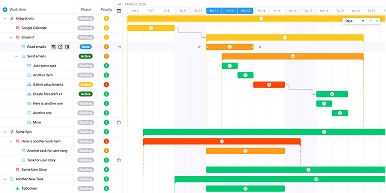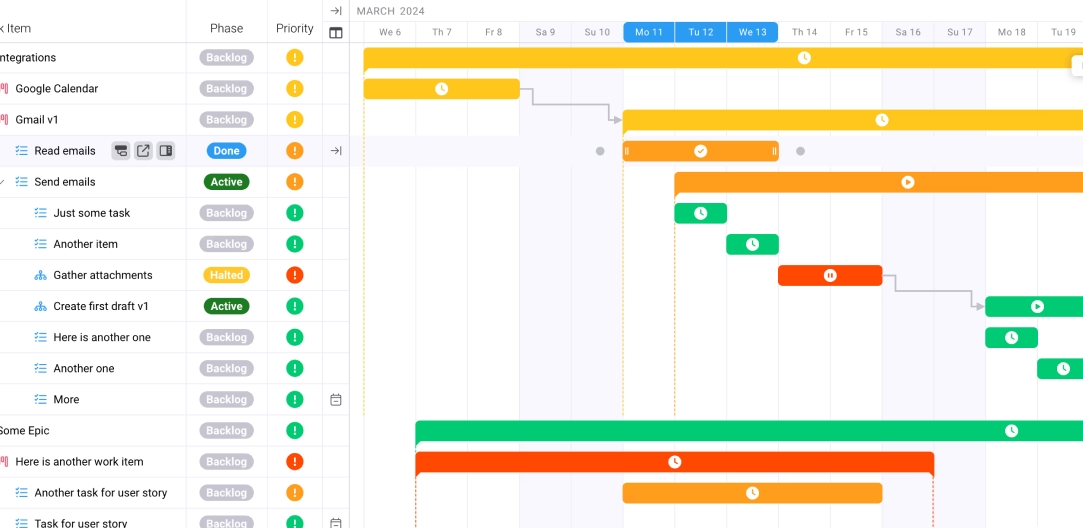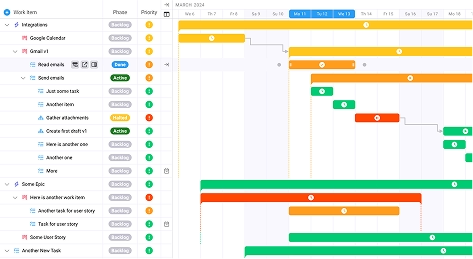
Marketing Project Kickoff Checklist: 12 Essential Steps for Campaign Success in 2026
Key takeaways:
- A comprehensive marketing project kickoff checklist reduces campaign failure rates by up to 50% through proper planning and stakeholder alignment
- Clear objective setting and team role definition prevent scope creep and ensure everyone works toward the same goals
- Proper resource allocation and timeline management during kickoff phases prevent budget overruns and missed deadlines
- Regular check-in protocols established during kickoff improve team communication and project transparency throughout execution
Every marketing campaign tells a story—but here’s the uncomfortable truth that over 50% of all projects fail before they even reach the finish line. The marketing project kickoff checklist you’re about to discover changes this narrative by providing a bulletproof foundation that transforms chaotic campaigns into systematic successes. Whether you’re launching a multi-million dollar brand awareness initiative or a targeted social media campaign, the way you begin determines everything that follows.
The Current Marketing Campaign Crisis: Why Most Projects Fail
The marketing landscape in 2026 presents unprecedented challenges. With 72% of overall marketing budgets being allocated to digital marketing channels, the pressure to deliver measurable results has never been higher. Yet 37% of projects fail due to a lack of clearly defined objectives and milestones, while 44% of businesses lack a quantitative idea of their marketing’s impact.
The stakes are enormous. Several high-profile brands faced unexpected backlash over failed marketing campaigns in 2024, proving that even established companies with substantial resources can stumble when proper planning protocols aren’t followed. The common thread among these failures? They all started with inadequate kickoff processes.
Project management is essential for modern marketing teams to maintain organization and meet deadlines, yet most marketing professionals receive little formal training in systematic campaign initiation. This gap between strategy and execution creates a perfect storm for project failure.
The solution lies in implementing a comprehensive marketing project kickoff checklist that addresses every critical element before campaign execution begins. Only 2.5% of companies manage to finish all of their projects successfully, but those that do share one common characteristic: they invest heavily in the planning and kickoff phases.
The Strategic Framework: 12-Step Marketing Project Kickoff Methodology
A successful marketing project kickoff checklist serves as your campaign’s North Star, guiding every decision and action that follows. This systematic approach transforms abstract ideas into concrete deliverables while establishing the foundation for measurable success.
The framework operates on three core principles: clarity, alignment, and accountability. Each step builds upon the previous one, creating a comprehensive blueprint that eliminates guesswork and reduces the likelihood of costly mistakes. Only 26% of employees have a very clear understanding of how their individual work relates to company goals, making this structured approach essential for marketing team success.
This marketing project kickoff checklist acknowledges that modern campaigns involve multiple stakeholders, complex timelines, and evolving requirements. Rather than treating these as obstacles, the framework embraces this complexity by providing clear protocols for managing change and maintaining focus on core objectives.
Implementation Tactics: The 12 Essential Steps
Step 1: Define Campaign Objectives and Success Metrics
Begin your marketing project kickoff checklist by establishing crystal-clear campaign objectives that align with broader business goals. 81% of consumers need to trust a brand before buying, making it essential to define not just what you want to achieve, but how you’ll measure meaningful progress toward building that trust.
Create SMART objectives (Specific, Measurable, Achievable, Relevant, Time-bound) that connect directly to revenue or key performance indicators. Tracking weekly KPIs is crucial for marketing project manager success, so establish both short-term milestones and long-term success metrics during this initial phase.
Document your success metrics in a shared framework that all stakeholders can access and understand. This transparency prevents scope creep and ensures everyone maintains focus on the same outcomes throughout the campaign lifecycle.
Step 2: Identify and Align Key Stakeholders
Stakeholder alignment represents one of the most critical elements of your marketing project kickoff checklist. Begin by mapping all internal and external parties who will influence or be impacted by the campaign, including department heads, creative teams, external agencies, and client representatives.
Schedule individual pre-kickoff conversations with key stakeholders to understand their expectations, concerns, and success criteria. These discussions reveal potential conflicts early and allow you to address them before they impact campaign execution.
Create a stakeholder communication matrix that defines how frequently each party will receive updates, what information they need, and their decision-making authority within the project. This prevents confusion and ensures smooth collaboration throughout the campaign.
Step 3: Establish Team Roles and Responsibilities
Clear role definition prevents the confusion that derails many marketing campaigns. Use a RACI matrix (Responsible, Accountable, Consulted, Informed) to document who owns each aspect of the campaign, from creative development to performance analysis.
Marketing agencies require specialized project management frameworks that actually work, making it essential to assign specific team members to specific functions based on their expertise and capacity.
Document contact information, availability schedules, and backup assignments for critical roles. This contingency planning ensures campaign continuity even when team members face unexpected conflicts or workload changes.
Step 4: Create Detailed Project Timeline and Milestones
Transform your campaign vision into an actionable timeline with specific milestones, dependencies, and buffer periods. Include both internal deadlines and external commitments, such as client review periods or media buying deadlines.
48% of marketers plan to include email automation in their email programs, highlighting the importance of coordinating multiple campaign elements simultaneously. Your timeline should account for these parallel workstreams and their interdependencies.
Build in 15-20% buffer time for each major milestone to accommodate inevitable revisions and unexpected challenges. This padding prevents small delays from cascading into major timeline disruptions.
Step 5: Define Project Scope and Boundaries
Scope creep kills more marketing campaigns than any other factor. Use your marketing project kickoff checklist to establish clear boundaries around what is included in the current campaign and what falls outside its parameters.
Create a scope statement that explicitly lists deliverables, channels, target audiences, and campaign duration. More importantly, document what the campaign will not include to prevent unauthorized additions later.
Establish a formal change management process that requires stakeholder approval for any scope modifications. This process should include impact assessments for timeline, budget, and resource allocation.
Step 6: Allocate Resources and Budget
Proper resource allocation during your marketing project kickoff checklist prevents budget overruns and ensures adequate support for all campaign elements. Create detailed budget breakdowns by category, including creative development, media spend, technology costs, and personnel time.
Streamlined campaign management leads to better marketing outcomes, making it essential to allocate resources not just for execution but also for project management and coordination activities.
Include contingency funds (typically 10-15% of total budget) for unexpected opportunities or challenges. Document approval processes for accessing these funds to maintain fiscal responsibility while preserving flexibility.
Step 7: Select Technology Stack and Tools
Modern marketing campaigns require sophisticated technology coordination. During your marketing project kickoff checklist review, identify all software platforms, integrations, and tools needed for successful campaign execution.
Create a technology map that shows how different systems will interact, who has access to each platform, and where campaign data will be stored and analyzed. This prevents integration issues and ensures smooth workflow between team members.
Establish data backup and security protocols for all campaign materials. Include password management and access control procedures to protect sensitive campaign information throughout the project lifecycle.
Step 8: Develop Communication Protocols
Effective communication can make the difference between campaign success and failure. Establish regular meeting schedules, reporting formats, and escalation procedures during your marketing project kickoff checklist implementation.
Define which communication channels will be used for different types of information: project updates, creative feedback, urgent issues, and general collaboration. This prevents important messages from getting lost in communication chaos.
Create template formats for status reports, meeting agendas, and decision logs to ensure consistent information sharing throughout the campaign. Consistency reduces confusion and speeds up decision-making processes.
Step 9: Plan Creative Development Workflow
Creative development often becomes a bottleneck in marketing campaigns due to unclear approval processes and subjective feedback. Use your marketing project kickoff checklist to establish structured creative workflows with specific review cycles and approval criteria.
Map out the creative development process from initial concepts through final approval, including the number of revision rounds, feedback consolidation procedures, and final approval authority. This prevents endless revision cycles that delay campaign launches.
Create creative brief templates and feedback frameworks that guide reviewers toward constructive, actionable input. Structured feedback accelerates the creative process and improves final deliverable quality.
Step 10: Establish Quality Assurance Procedures
Quality control must be built into your marketing project kickoff checklist rather than added as an afterthought. Define quality standards for all campaign elements, from creative assets to data tracking implementation.
Create checklists for different types of deliverables (emails, landing pages, advertisements, etc.) that cover both creative and technical requirements. These checklists prevent oversight errors that can damage campaign performance.
Assign specific team members to quality assurance roles and provide them with the authority to halt campaign launches if standards aren’t met. This prevents quality compromises that could harm brand reputation.
Step 11: Plan Performance Tracking and Analysis
Measurement planning should begin during your marketing project kickoff checklist review, not after campaign launch. Identify all metrics you’ll track, how you’ll collect data, and who will be responsible for analysis and reporting.
Set up tracking infrastructure, including analytics codes, conversion pixels, and reporting dashboards, before campaign launch. This ensures data collection begins immediately and prevents measurement gaps.
Create analysis templates and reporting schedules that will guide ongoing campaign optimization. Regular analysis enables real-time adjustments that improve campaign performance throughout its duration.
Step 12: Create Risk Management Strategy
Every marketing campaign faces potential risks, from creative rejection to technical failures to external market changes. Your marketing project kickoff checklist should include comprehensive risk identification and mitigation planning.
Brainstorm potential risks with your team and categorize them by likelihood and potential impact. Develop specific response plans for high-probability, high-impact risks to enable quick action when challenges arise.
Establish escalation procedures for different types of risks and ensure all team members understand when and how to activate contingency plans. Preparedness prevents small problems from becoming campaign disasters.
Measuring Success: Key Performance Indicators for Kickoff Excellence
Successful implementation of your marketing project kickoff checklist requires measurement and continuous improvement. Track both immediate kickoff metrics and long-term campaign outcomes to refine your process over time.
Immediate metrics include stakeholder alignment scores, timeline adherence, budget accuracy, and team satisfaction ratings. These indicators reveal whether your kickoff process effectively prepared the team for successful execution.
Long-term metrics should connect kickoff quality to campaign performance, including on-time delivery rates, budget adherence, objective achievement, and overall ROI. This data helps you identify which kickoff elements most directly impact campaign success.
Create feedback loops that capture lessons learned from each campaign and incorporate improvements into your marketing project kickoff checklist. Continuous refinement ensures your process evolves with changing market conditions and team capabilities.
Future Considerations: Evolving Your Marketing Project Kickoff Process
The marketing landscape continues evolving rapidly, requiring ongoing adaptation of your kickoff processes. Emerging technologies, changing consumer behaviors, and new regulatory requirements all impact how marketing campaigns should be planned and executed.
Artificial intelligence and automation tools are reshaping campaign management, enabling more sophisticated targeting and real-time optimization. Your marketing project kickoff checklist should account for these capabilities while maintaining human oversight for strategic decisions.
Remote and hybrid work environments require enhanced digital collaboration tools and more structured communication protocols. Consider how distributed teams impact your kickoff process and adjust accordingly to maintain effectiveness.
Increasing privacy regulations and data protection requirements necessitate more careful planning around data collection and usage. Ensure your kickoff process includes privacy compliance checks and legal review procedures.
Consumer expectations for personalized, authentic brand experiences continue rising. Your kickoff process should emphasize audience research and message testing to ensure campaigns resonate with target demographics.
Frequently Asked Questions
How long should a marketing project kickoff meeting last?
Most effective marketing project kickoff meetings run 60-90 minutes for internal teams and up to 2 hours for client-facing projects. The key is thorough preparation beforehand and focused agenda management during the meeting.
Who should attend the marketing project kickoff meeting?
Include all team members with direct project responsibilities, key stakeholders with decision-making authority, and external partners who will contribute to campaign execution. Avoid including observers who don’t have active roles.
What’s the biggest mistake teams make during campaign kickoffs?
The most common error is treating the kickoff as an information broadcast rather than an alignment and planning session. Effective kickoffs involve active participation from all attendees and result in clear action items and commitments.
How often should you revisit the marketing project kickoff checklist?
Review and update your checklist after each major campaign to incorporate lessons learned and process improvements. Conduct quarterly reviews to ensure the framework stays current with industry best practices.
Can the marketing project kickoff checklist be adapted for small campaigns?
Absolutely. Scale the complexity of each step to match campaign size and scope, but don’t skip steps entirely. Even small campaigns benefit from clear objectives, role definition, and communication protocols.
What technology tools best support the kickoff process?
Project management platforms, video conferencing tools, shared document systems, and digital whiteboard applications all enhance kickoff effectiveness. Choose tools that integrate well with your existing workflow.
How do you handle stakeholders who resist structured kickoff processes?
Focus on demonstrating value through improved campaign outcomes rather than enforcing process compliance. Share success stories and metrics that show how structured kickoffs lead to better results and reduced stress for everyone involved.
What’s the best way to document kickoff decisions and agreements?
Create a central project repository that houses all kickoff materials, including meeting notes, decision logs, approved timelines, and role assignments. Ensure all team members have access and know where to find information.
How do you adapt the kickoff process for international or multicultural campaigns?
Consider time zone coordination, cultural communication preferences, local market requirements, and regulatory differences. Build additional buffer time for coordination and ensure all materials are accessible in relevant languages.
What should you do if the kickoff reveals major project issues?
Don’t proceed with a flawed foundation. Address critical issues immediately, even if it means delaying the campaign launch. The investment in resolving kickoff-phase problems always pays dividends during execution.









